Task 4: Reflection on Working with Others in Health and Social Care
VerifiedAdded on 2021/06/15
|7
|1595
|54
Report
AI Summary
This report reflects on the student's experience of working with others in a health and social care setting, emphasizing the importance of effective communication, empathy, and problem-solving skills. The student identifies strengths and weaknesses, including a need for improved leadership...
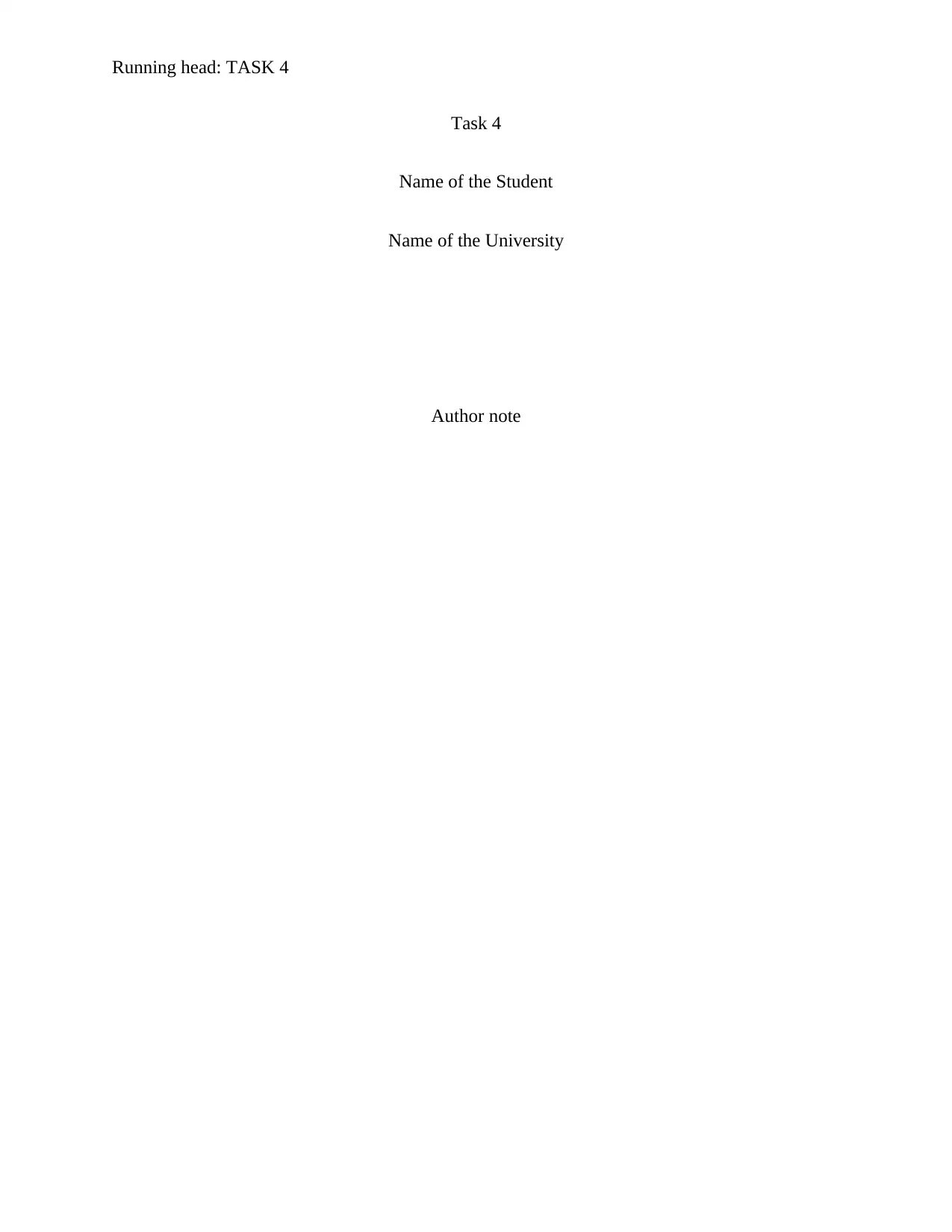
Running head: TASK 4
Task 4
Name of the Student
Name of the University
Author note
Task 4
Name of the Student
Name of the University
Author note
Paraphrase This Document
Need a fresh take? Get an instant paraphrase of this document with our AI Paraphraser
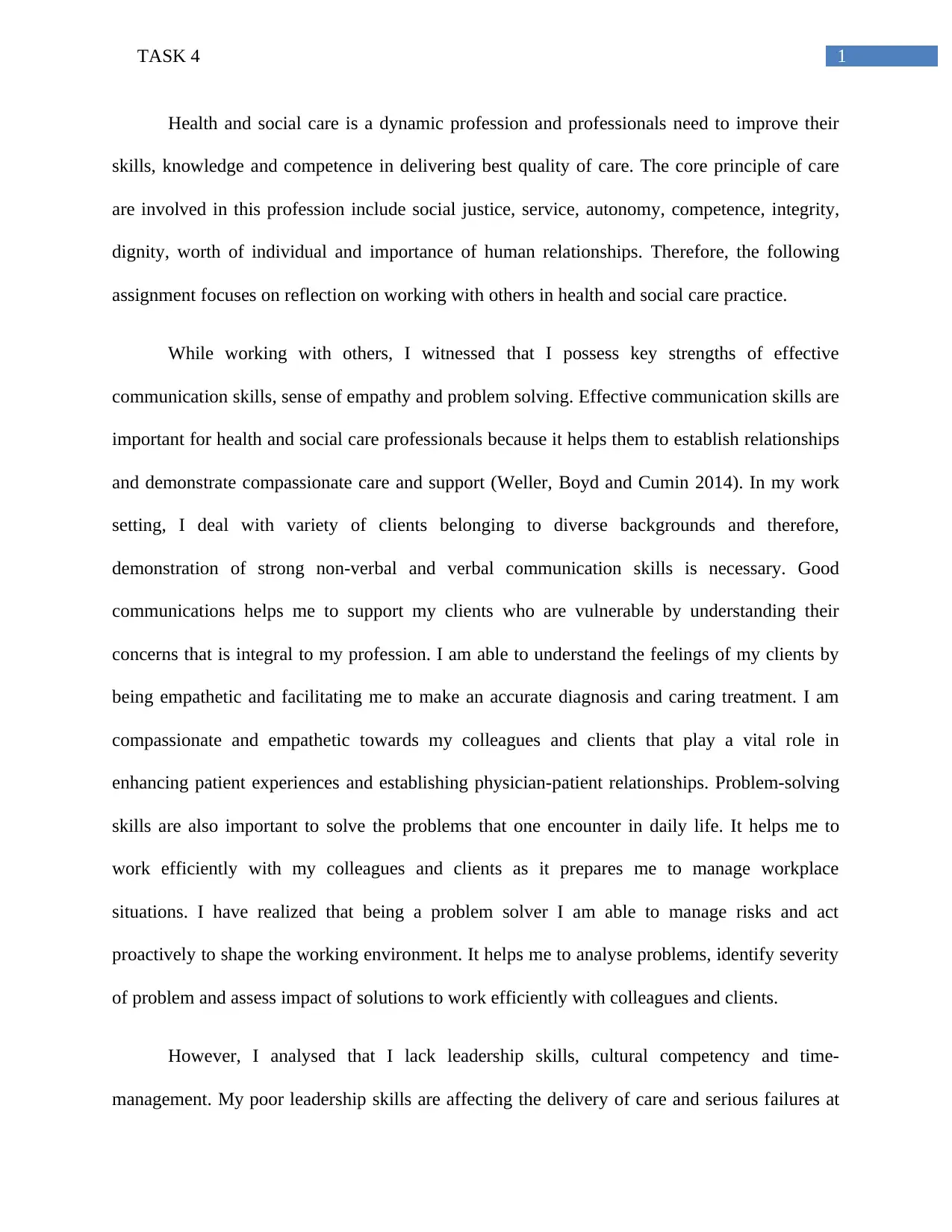
1TASK 4
Health and social care is a dynamic profession and professionals need to improve their
skills, knowledge and competence in delivering best quality of care. The core principle of care
are involved in this profession include social justice, service, autonomy, competence, integrity,
dignity, worth of individual and importance of human relationships. Therefore, the following
assignment focuses on reflection on working with others in health and social care practice.
While working with others, I witnessed that I possess key strengths of effective
communication skills, sense of empathy and problem solving. Effective communication skills are
important for health and social care professionals because it helps them to establish relationships
and demonstrate compassionate care and support (Weller, Boyd and Cumin 2014). In my work
setting, I deal with variety of clients belonging to diverse backgrounds and therefore,
demonstration of strong non-verbal and verbal communication skills is necessary. Good
communications helps me to support my clients who are vulnerable by understanding their
concerns that is integral to my profession. I am able to understand the feelings of my clients by
being empathetic and facilitating me to make an accurate diagnosis and caring treatment. I am
compassionate and empathetic towards my colleagues and clients that play a vital role in
enhancing patient experiences and establishing physician-patient relationships. Problem-solving
skills are also important to solve the problems that one encounter in daily life. It helps me to
work efficiently with my colleagues and clients as it prepares me to manage workplace
situations. I have realized that being a problem solver I am able to manage risks and act
proactively to shape the working environment. It helps me to analyse problems, identify severity
of problem and assess impact of solutions to work efficiently with colleagues and clients.
However, I analysed that I lack leadership skills, cultural competency and time-
management. My poor leadership skills are affecting the delivery of care and serious failures at
Health and social care is a dynamic profession and professionals need to improve their
skills, knowledge and competence in delivering best quality of care. The core principle of care
are involved in this profession include social justice, service, autonomy, competence, integrity,
dignity, worth of individual and importance of human relationships. Therefore, the following
assignment focuses on reflection on working with others in health and social care practice.
While working with others, I witnessed that I possess key strengths of effective
communication skills, sense of empathy and problem solving. Effective communication skills are
important for health and social care professionals because it helps them to establish relationships
and demonstrate compassionate care and support (Weller, Boyd and Cumin 2014). In my work
setting, I deal with variety of clients belonging to diverse backgrounds and therefore,
demonstration of strong non-verbal and verbal communication skills is necessary. Good
communications helps me to support my clients who are vulnerable by understanding their
concerns that is integral to my profession. I am able to understand the feelings of my clients by
being empathetic and facilitating me to make an accurate diagnosis and caring treatment. I am
compassionate and empathetic towards my colleagues and clients that play a vital role in
enhancing patient experiences and establishing physician-patient relationships. Problem-solving
skills are also important to solve the problems that one encounter in daily life. It helps me to
work efficiently with my colleagues and clients as it prepares me to manage workplace
situations. I have realized that being a problem solver I am able to manage risks and act
proactively to shape the working environment. It helps me to analyse problems, identify severity
of problem and assess impact of solutions to work efficiently with colleagues and clients.
However, I analysed that I lack leadership skills, cultural competency and time-
management. My poor leadership skills are affecting the delivery of care and serious failures at
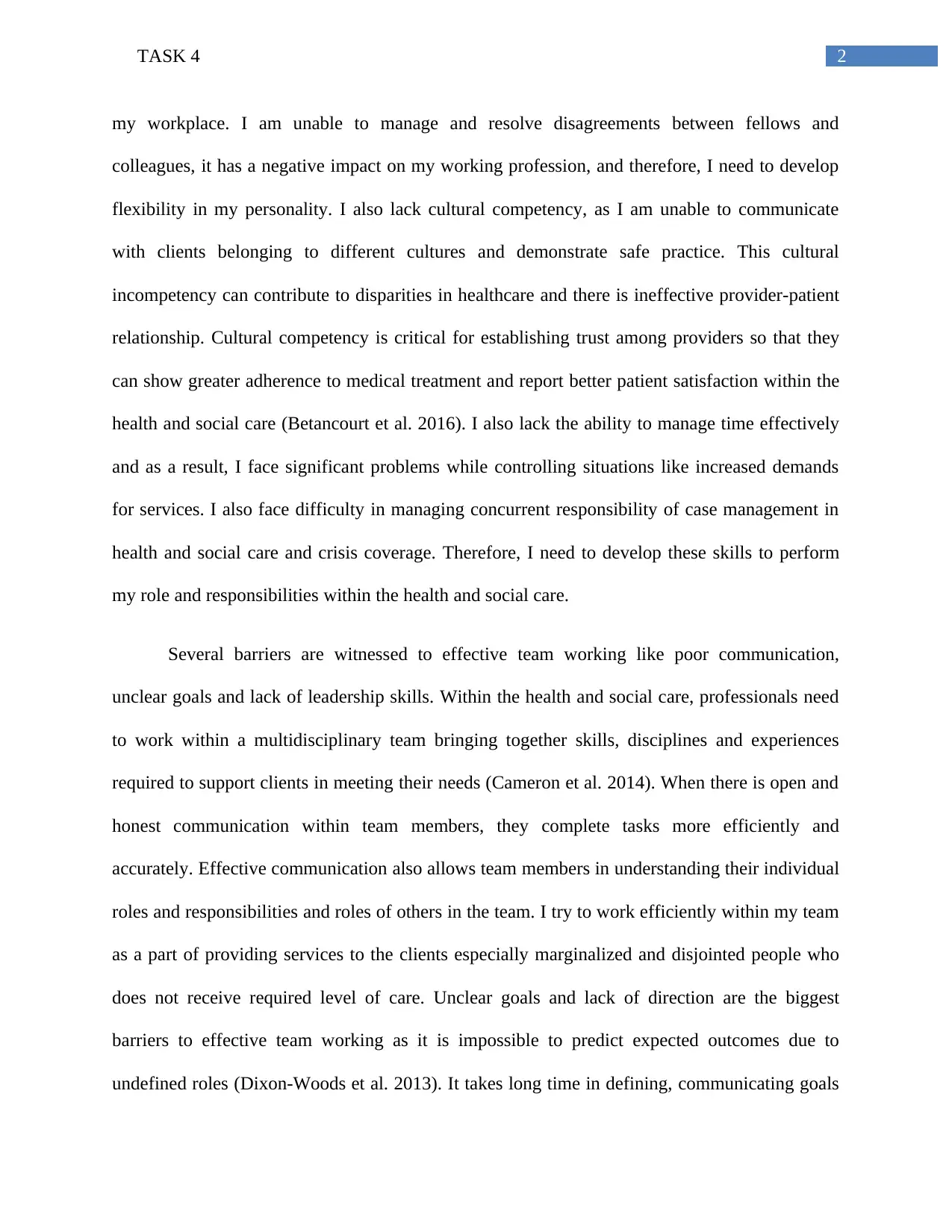
2TASK 4
my workplace. I am unable to manage and resolve disagreements between fellows and
colleagues, it has a negative impact on my working profession, and therefore, I need to develop
flexibility in my personality. I also lack cultural competency, as I am unable to communicate
with clients belonging to different cultures and demonstrate safe practice. This cultural
incompetency can contribute to disparities in healthcare and there is ineffective provider-patient
relationship. Cultural competency is critical for establishing trust among providers so that they
can show greater adherence to medical treatment and report better patient satisfaction within the
health and social care (Betancourt et al. 2016). I also lack the ability to manage time effectively
and as a result, I face significant problems while controlling situations like increased demands
for services. I also face difficulty in managing concurrent responsibility of case management in
health and social care and crisis coverage. Therefore, I need to develop these skills to perform
my role and responsibilities within the health and social care.
Several barriers are witnessed to effective team working like poor communication,
unclear goals and lack of leadership skills. Within the health and social care, professionals need
to work within a multidisciplinary team bringing together skills, disciplines and experiences
required to support clients in meeting their needs (Cameron et al. 2014). When there is open and
honest communication within team members, they complete tasks more efficiently and
accurately. Effective communication also allows team members in understanding their individual
roles and responsibilities and roles of others in the team. I try to work efficiently within my team
as a part of providing services to the clients especially marginalized and disjointed people who
does not receive required level of care. Unclear goals and lack of direction are the biggest
barriers to effective team working as it is impossible to predict expected outcomes due to
undefined roles (Dixon-Woods et al. 2013). It takes long time in defining, communicating goals
my workplace. I am unable to manage and resolve disagreements between fellows and
colleagues, it has a negative impact on my working profession, and therefore, I need to develop
flexibility in my personality. I also lack cultural competency, as I am unable to communicate
with clients belonging to different cultures and demonstrate safe practice. This cultural
incompetency can contribute to disparities in healthcare and there is ineffective provider-patient
relationship. Cultural competency is critical for establishing trust among providers so that they
can show greater adherence to medical treatment and report better patient satisfaction within the
health and social care (Betancourt et al. 2016). I also lack the ability to manage time effectively
and as a result, I face significant problems while controlling situations like increased demands
for services. I also face difficulty in managing concurrent responsibility of case management in
health and social care and crisis coverage. Therefore, I need to develop these skills to perform
my role and responsibilities within the health and social care.
Several barriers are witnessed to effective team working like poor communication,
unclear goals and lack of leadership skills. Within the health and social care, professionals need
to work within a multidisciplinary team bringing together skills, disciplines and experiences
required to support clients in meeting their needs (Cameron et al. 2014). When there is open and
honest communication within team members, they complete tasks more efficiently and
accurately. Effective communication also allows team members in understanding their individual
roles and responsibilities and roles of others in the team. I try to work efficiently within my team
as a part of providing services to the clients especially marginalized and disjointed people who
does not receive required level of care. Unclear goals and lack of direction are the biggest
barriers to effective team working as it is impossible to predict expected outcomes due to
undefined roles (Dixon-Woods et al. 2013). It takes long time in defining, communicating goals
⊘ This is a preview!⊘
Do you want full access?
Subscribe today to unlock all pages.

Trusted by 1+ million students worldwide
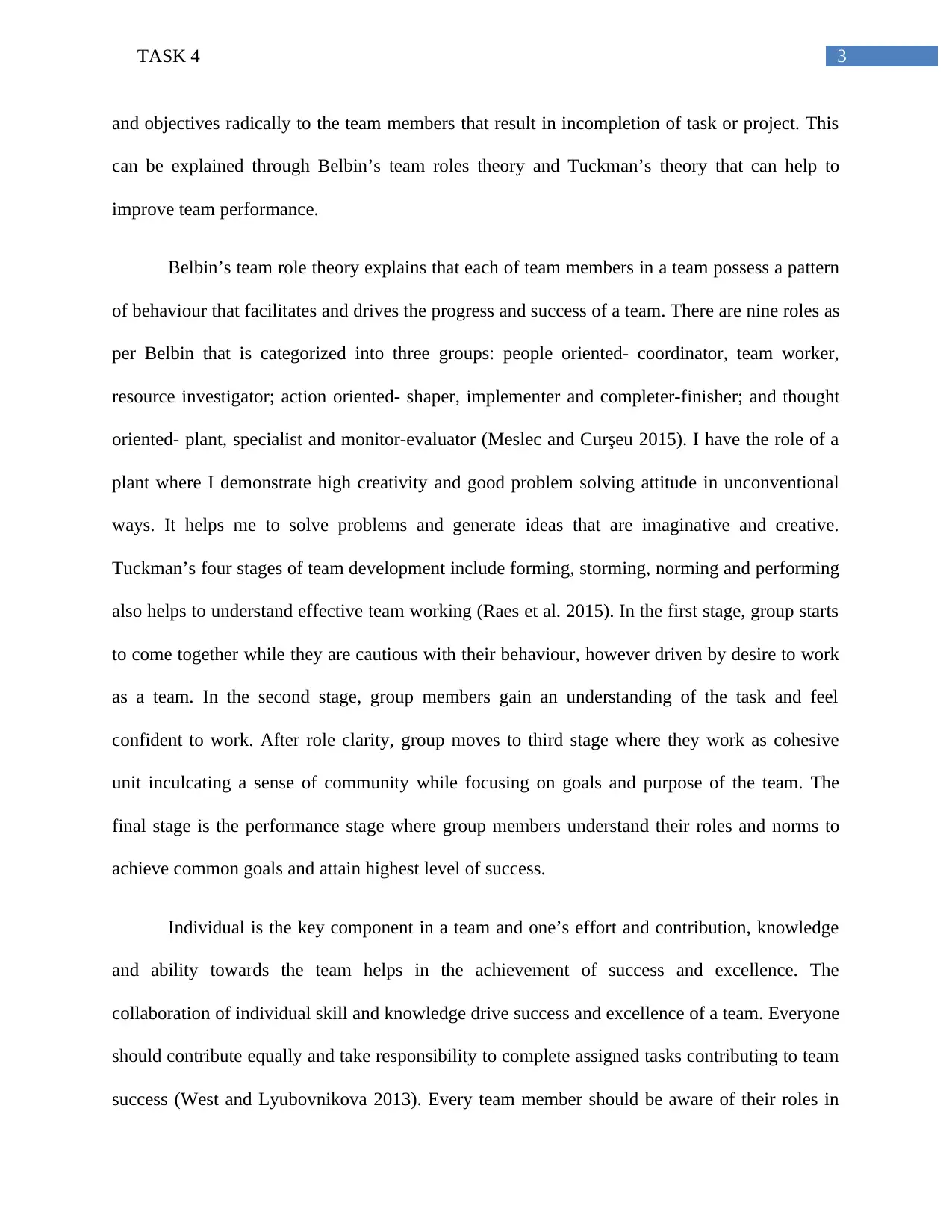
3TASK 4
and objectives radically to the team members that result in incompletion of task or project. This
can be explained through Belbin’s team roles theory and Tuckman’s theory that can help to
improve team performance.
Belbin’s team role theory explains that each of team members in a team possess a pattern
of behaviour that facilitates and drives the progress and success of a team. There are nine roles as
per Belbin that is categorized into three groups: people oriented- coordinator, team worker,
resource investigator; action oriented- shaper, implementer and completer-finisher; and thought
oriented- plant, specialist and monitor-evaluator (Meslec and Curşeu 2015). I have the role of a
plant where I demonstrate high creativity and good problem solving attitude in unconventional
ways. It helps me to solve problems and generate ideas that are imaginative and creative.
Tuckman’s four stages of team development include forming, storming, norming and performing
also helps to understand effective team working (Raes et al. 2015). In the first stage, group starts
to come together while they are cautious with their behaviour, however driven by desire to work
as a team. In the second stage, group members gain an understanding of the task and feel
confident to work. After role clarity, group moves to third stage where they work as cohesive
unit inculcating a sense of community while focusing on goals and purpose of the team. The
final stage is the performance stage where group members understand their roles and norms to
achieve common goals and attain highest level of success.
Individual is the key component in a team and one’s effort and contribution, knowledge
and ability towards the team helps in the achievement of success and excellence. The
collaboration of individual skill and knowledge drive success and excellence of a team. Everyone
should contribute equally and take responsibility to complete assigned tasks contributing to team
success (West and Lyubovnikova 2013). Every team member should be aware of their roles in
and objectives radically to the team members that result in incompletion of task or project. This
can be explained through Belbin’s team roles theory and Tuckman’s theory that can help to
improve team performance.
Belbin’s team role theory explains that each of team members in a team possess a pattern
of behaviour that facilitates and drives the progress and success of a team. There are nine roles as
per Belbin that is categorized into three groups: people oriented- coordinator, team worker,
resource investigator; action oriented- shaper, implementer and completer-finisher; and thought
oriented- plant, specialist and monitor-evaluator (Meslec and Curşeu 2015). I have the role of a
plant where I demonstrate high creativity and good problem solving attitude in unconventional
ways. It helps me to solve problems and generate ideas that are imaginative and creative.
Tuckman’s four stages of team development include forming, storming, norming and performing
also helps to understand effective team working (Raes et al. 2015). In the first stage, group starts
to come together while they are cautious with their behaviour, however driven by desire to work
as a team. In the second stage, group members gain an understanding of the task and feel
confident to work. After role clarity, group moves to third stage where they work as cohesive
unit inculcating a sense of community while focusing on goals and purpose of the team. The
final stage is the performance stage where group members understand their roles and norms to
achieve common goals and attain highest level of success.
Individual is the key component in a team and one’s effort and contribution, knowledge
and ability towards the team helps in the achievement of success and excellence. The
collaboration of individual skill and knowledge drive success and excellence of a team. Everyone
should contribute equally and take responsibility to complete assigned tasks contributing to team
success (West and Lyubovnikova 2013). Every team member should be aware of their roles in
Paraphrase This Document
Need a fresh take? Get an instant paraphrase of this document with our AI Paraphraser
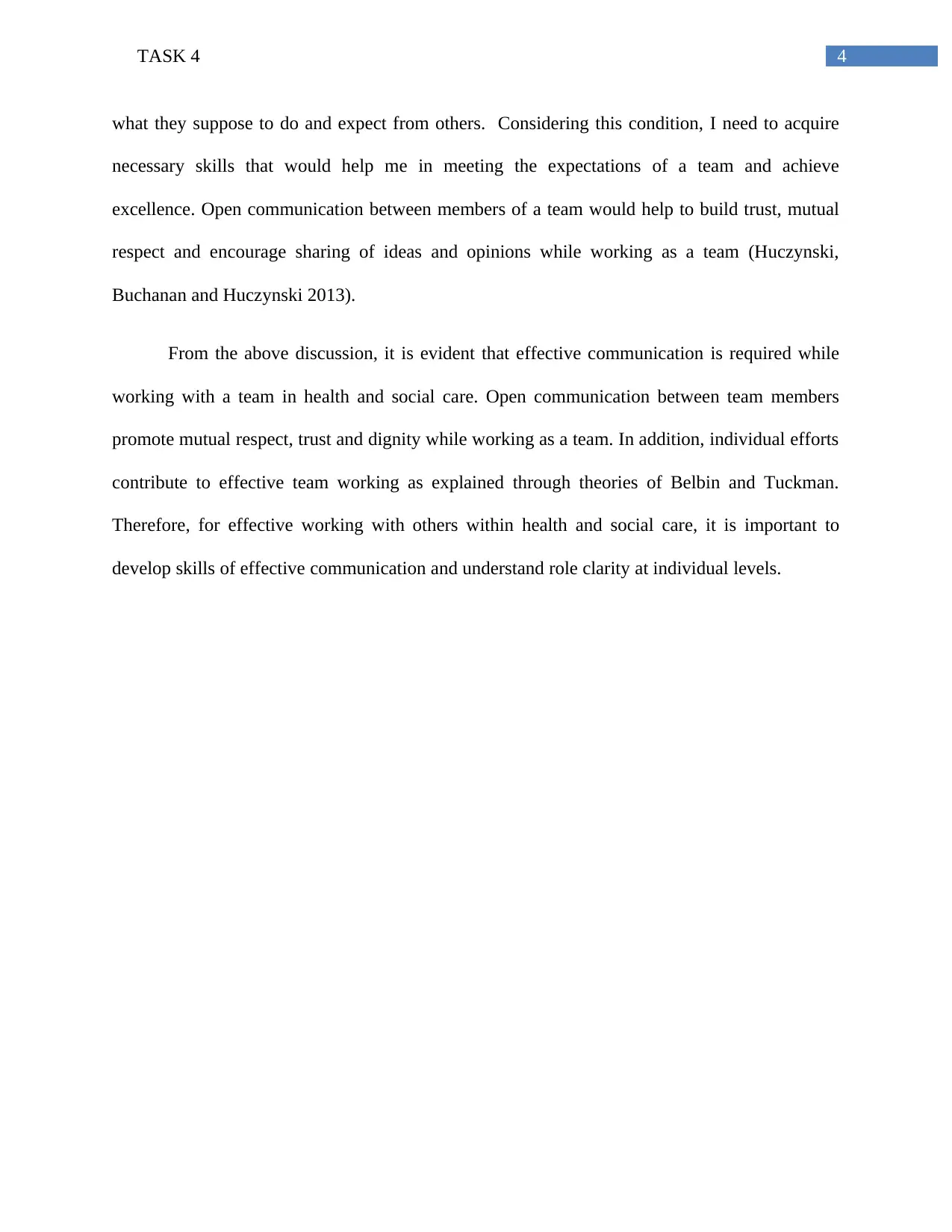
4TASK 4
what they suppose to do and expect from others. Considering this condition, I need to acquire
necessary skills that would help me in meeting the expectations of a team and achieve
excellence. Open communication between members of a team would help to build trust, mutual
respect and encourage sharing of ideas and opinions while working as a team (Huczynski,
Buchanan and Huczynski 2013).
From the above discussion, it is evident that effective communication is required while
working with a team in health and social care. Open communication between team members
promote mutual respect, trust and dignity while working as a team. In addition, individual efforts
contribute to effective team working as explained through theories of Belbin and Tuckman.
Therefore, for effective working with others within health and social care, it is important to
develop skills of effective communication and understand role clarity at individual levels.
what they suppose to do and expect from others. Considering this condition, I need to acquire
necessary skills that would help me in meeting the expectations of a team and achieve
excellence. Open communication between members of a team would help to build trust, mutual
respect and encourage sharing of ideas and opinions while working as a team (Huczynski,
Buchanan and Huczynski 2013).
From the above discussion, it is evident that effective communication is required while
working with a team in health and social care. Open communication between team members
promote mutual respect, trust and dignity while working as a team. In addition, individual efforts
contribute to effective team working as explained through theories of Belbin and Tuckman.
Therefore, for effective working with others within health and social care, it is important to
develop skills of effective communication and understand role clarity at individual levels.
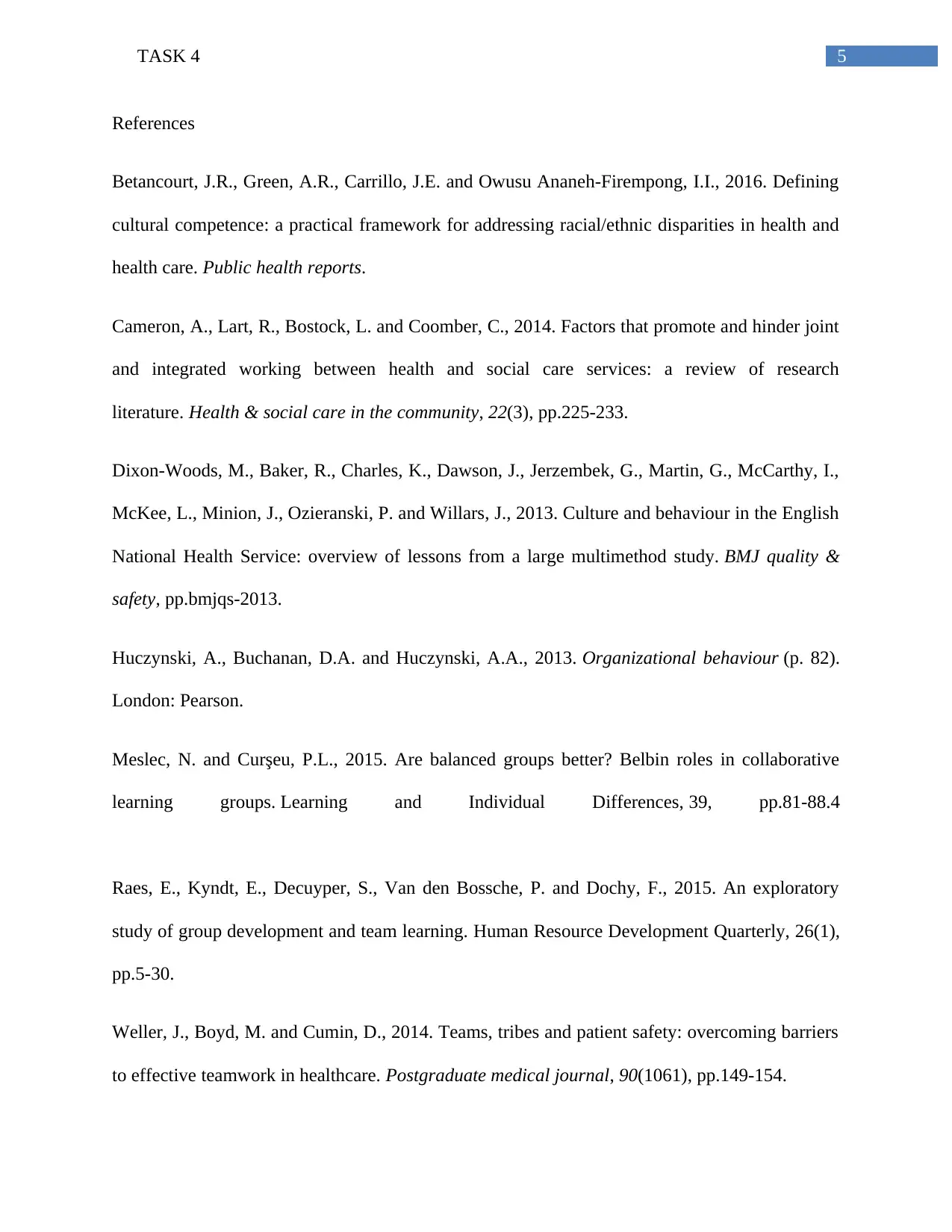
5TASK 4
References
Betancourt, J.R., Green, A.R., Carrillo, J.E. and Owusu Ananeh-Firempong, I.I., 2016. Defining
cultural competence: a practical framework for addressing racial/ethnic disparities in health and
health care. Public health reports.
Cameron, A., Lart, R., Bostock, L. and Coomber, C., 2014. Factors that promote and hinder joint
and integrated working between health and social care services: a review of research
literature. Health & social care in the community, 22(3), pp.225-233.
Dixon-Woods, M., Baker, R., Charles, K., Dawson, J., Jerzembek, G., Martin, G., McCarthy, I.,
McKee, L., Minion, J., Ozieranski, P. and Willars, J., 2013. Culture and behaviour in the English
National Health Service: overview of lessons from a large multimethod study. BMJ quality &
safety, pp.bmjqs-2013.
Huczynski, A., Buchanan, D.A. and Huczynski, A.A., 2013. Organizational behaviour (p. 82).
London: Pearson.
Meslec, N. and Curşeu, P.L., 2015. Are balanced groups better? Belbin roles in collaborative
learning groups. Learning and Individual Differences, 39, pp.81-88.4
Raes, E., Kyndt, E., Decuyper, S., Van den Bossche, P. and Dochy, F., 2015. An exploratory
study of group development and team learning. Human Resource Development Quarterly, 26(1),
pp.5-30.
Weller, J., Boyd, M. and Cumin, D., 2014. Teams, tribes and patient safety: overcoming barriers
to effective teamwork in healthcare. Postgraduate medical journal, 90(1061), pp.149-154.
References
Betancourt, J.R., Green, A.R., Carrillo, J.E. and Owusu Ananeh-Firempong, I.I., 2016. Defining
cultural competence: a practical framework for addressing racial/ethnic disparities in health and
health care. Public health reports.
Cameron, A., Lart, R., Bostock, L. and Coomber, C., 2014. Factors that promote and hinder joint
and integrated working between health and social care services: a review of research
literature. Health & social care in the community, 22(3), pp.225-233.
Dixon-Woods, M., Baker, R., Charles, K., Dawson, J., Jerzembek, G., Martin, G., McCarthy, I.,
McKee, L., Minion, J., Ozieranski, P. and Willars, J., 2013. Culture and behaviour in the English
National Health Service: overview of lessons from a large multimethod study. BMJ quality &
safety, pp.bmjqs-2013.
Huczynski, A., Buchanan, D.A. and Huczynski, A.A., 2013. Organizational behaviour (p. 82).
London: Pearson.
Meslec, N. and Curşeu, P.L., 2015. Are balanced groups better? Belbin roles in collaborative
learning groups. Learning and Individual Differences, 39, pp.81-88.4
Raes, E., Kyndt, E., Decuyper, S., Van den Bossche, P. and Dochy, F., 2015. An exploratory
study of group development and team learning. Human Resource Development Quarterly, 26(1),
pp.5-30.
Weller, J., Boyd, M. and Cumin, D., 2014. Teams, tribes and patient safety: overcoming barriers
to effective teamwork in healthcare. Postgraduate medical journal, 90(1061), pp.149-154.
⊘ This is a preview!⊘
Do you want full access?
Subscribe today to unlock all pages.

Trusted by 1+ million students worldwide
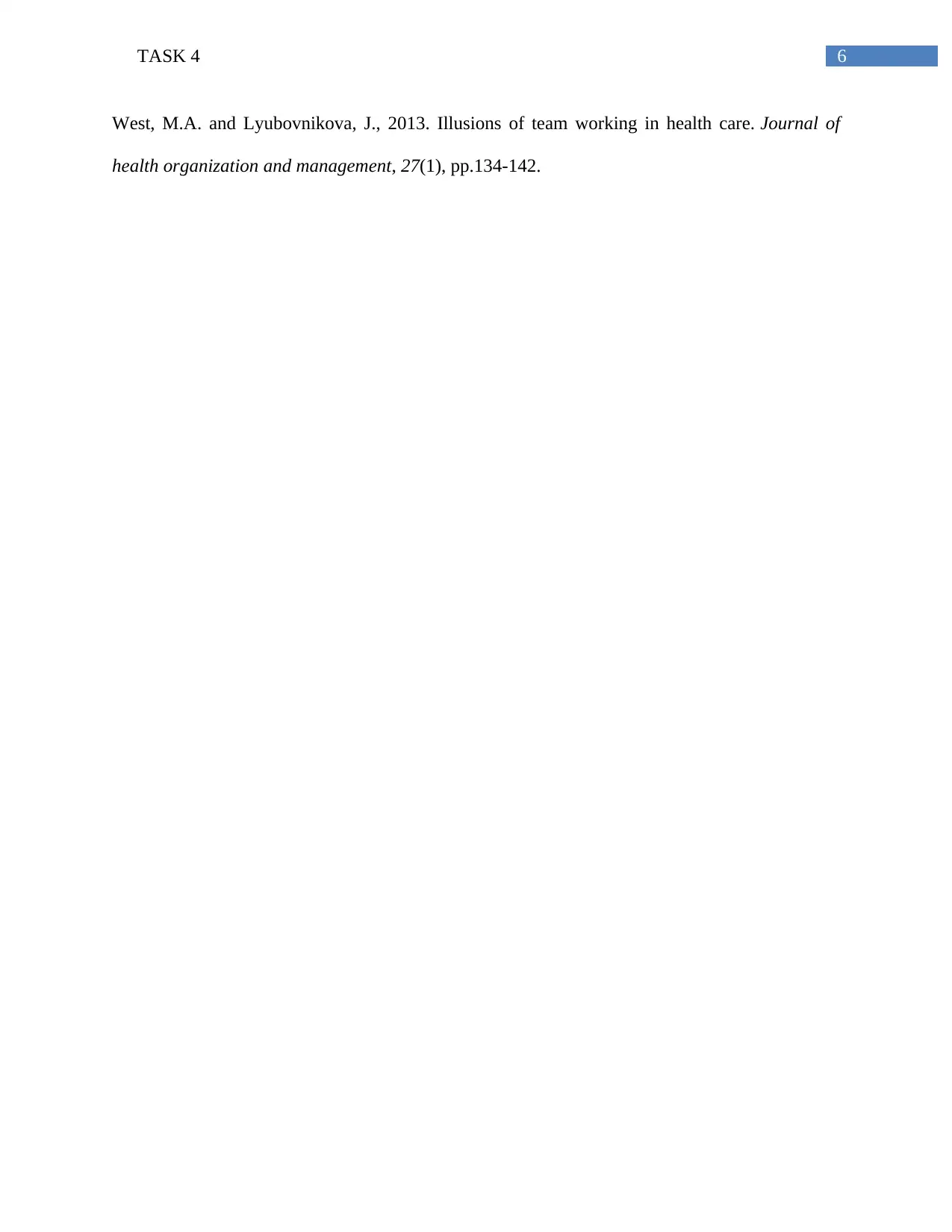
6TASK 4
West, M.A. and Lyubovnikova, J., 2013. Illusions of team working in health care. Journal of
health organization and management, 27(1), pp.134-142.
West, M.A. and Lyubovnikova, J., 2013. Illusions of team working in health care. Journal of
health organization and management, 27(1), pp.134-142.
1 out of 7
Related Documents
Your All-in-One AI-Powered Toolkit for Academic Success.
+13062052269
info@desklib.com
Available 24*7 on WhatsApp / Email
![[object Object]](/_next/static/media/star-bottom.7253800d.svg)
Unlock your academic potential
© 2024 | Zucol Services PVT LTD | All rights reserved.



![Nursing Personal Statement for University Application - [Year]](/_next/image/?url=https%3A%2F%2Fdesklib.com%2Fmedia%2Fimages%2Ffs%2F8b9dc1d7da2e42a582d59123880456ac.jpg&w=256&q=75)

